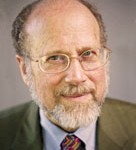Jonathan Shay, one of this year’s First-Year Experience featured speakers, linked classical literature and war during his campus lecture Sept. 21.

Shay discussed David Malouf’s novel “Ransom,” the First-Year Reading Initiative book, and Homer’s epic work, “The Iliad.”
Shay worked for 20 years in the Department of Veterans Affairs Outpatient Clinic in Boston as a staff psychiatrist. He retired in 2008 to devote his time to preventive psychiatry in the military.
He was awarded a $500,000 fellowship from the John D. and Catherine T. MacArthur Foundation, nicknamed the “genius grant.” Shay has been a MacArthur Fellow since 2008.
Chief Copy Editor Marissa Smith spoke with Shay about his work and future endeavors.
Marissa Smith: Why is it important for students at Ithaca College to continue studying works such as the Iliad?
Jonathan Shay: It’s a general fact about fictions — what Aristotle would have called poetry — that fictions are experiments with the moral materials of a place and a time. And if the experiments are honestly done, we always learn something of value from them. Now Homer does not cook the books on the nature of war, especially in “The Iliad.” But the Iliad really tells the truth about war and what matters in the hearts of the people in it. And so as long as we collectively pursue this practice that we call war — and I tell every audience including uniformed audiences — the primary prevention of combat trauma is the elimination of the human practice of war.
MS: Did your works “Achilles in Vietnam” and “Odysseus in America” stem from mythology or psychology?
JS: Both books are really strongly about the social and ethical dimension of military forces and of being at war with a human enemy. The thing that makes the enemy so dangerous is that the enemy has all the same virtues that we have. They’re intelligent, they’re observant, they’re innovative, they’re courageous, they’re self-sacrificing, they’re loyal to their friends, they endure all kinds of privations. It’s all of those virtues that are the same ones that we applaud in ourselves. The most disastrous mistake that anybody can make is to regard the enemy as mere inanimate matter, like the rock that has to be blasted and pushed out of the way to get at a vein of copper ore.
MS: Were you surprised to be awarded the MacArthur Grant?
JS: Oh, of course I was surprised. For a bunch of years I have been with my tongue slightly in my cheek describing myself as an unlicensed philosopher. And it’s possible that they took that more seriously because the only demographic, the only category that they will give fellowships to in old age is philosophers. So I think they must have pulled my tongue out of my cheek long enough to decide that they wanted to do that. It’s terrific.
MS: What do you hope audiences walk away with from your speeches?
JS: That the thing that matters most in the heart of a soldier is the social and ethical characteristics of his own forces. Yet, the enemy matters, but in the end, the enemy can’t do as much harm to the mind and the spirit as his own forces. When I say my mission is the prevention of psychological and moral injury, that little twist at the end — moral injury, what is that? It’s what happens when there is a betrayal of what’s right and that’s squarely in the culture. A betrayal of what’s right by someone who holds legitimate authority.







